After a few months of early developer previews, at Google I/O 2021 Google has finally given us an in-depth look at the nest-generation version of Android, Android 12 — and boy is it an upgrade. The new operating system represents a massive overhaul to the user interface, along with support for new features like stacked widgets, new settings toggles, and more.
Android 12 will be released to the public later this year, likely in September or October. Until then, early builds of it will be available in the form of beta releases, though we don’t recommend installing those on your primary devices considering the fact that they likely have bugs that could impact usage of your phone.
Interested in learning more about Android announcements from Google I/O? Here are all the major new features announced.
A “Material You” design

Perhaps the most obvious update to Android 12 is its all-new design. Google calls this design “Material You,” thanks largely to the fact that design is truly based on the user. That means that the color scheme of the whole operating system will change depending on the user’s wallpaper — including things like dominant colors, complementary colors, and colors that add detail.
There are other tweaks to the software too. For example, things like the clock will appear larger on the lock screen when the user has no notifications to show, which not only makes it easier to see the time at a glance but also indicates that a user is all caught up on their notifications. And, there are more visual cues to indicate if an app is using the camera or microphone, like on iOS. These design changes will first come to Pixel phones in the fall.
Even better, however, is the fact that the design will sync across devices — so if you’re signed in to your account on a Chromebook, it should carry a similar design to your phone.
Redesigned system spaces

So-called “system spaces” are getting a refresh to be a little more helpful too. These spaces include areas like the notification shade, quick settings, and the power button menu. In the notification shade, users will get better at-a-glance views of their notifications and media controls, as well as their quick settings.
Users will get access to some of their most-used quick settings on the first swipe in the notification shade and can access more of those settings with another swipe — which should hopefully make the area a little more useful. The quick settings menu has also been rebuilt to offer things like smart home controls and access to Google Pay — while the power button menu has been replaced with access to Google Assistant.
Privacy

Google wants to improve privacy on Android too. The company is bringing a new “Privacy Dashboard” to the phone, which gives users more granular control over the data on their phone.
Privacy Dashboard is meant to be a single look at data privacy across your phone. In the new app, you’ll be able to see your permissions settings, and how often that data is being accessed, plus you can quickly revoke permission from an app.
There are new permissions in Android too. For example, users can give approximate location information, instead of specific location information, which will be helpful for things like weather apps.
Privacy controls are being built directly in the Android operating system — through the new Android Private Computer Core. The Computer Core is meant to handle A.I. applications that might handle sensitive data — and as such it will process things like Live Caption, Smart Reply, and more. This all happens on-device and separated from a network.
Digital Car Key

Apple announced CarKey last year, but now it’s Google’s turn. The company announced that Android 12 will include support for a new digital car key feature that will let users with a compatible phone unlock their car — without the need for another key. The feature makes use of Ultra Wideband tech, meaning that users won’t have to remove their phone from their pockets to use it — plus it uses NFC as a backup in case a phone doesn’t have Ultra Wideband built into it. The feature will reportedly be available to “select” Samsung and Pixel phones later this year.
Of course, equally as important as phone support is car support, and it may take some time for that to roll out. Despite the fact that Apple announced CarKey over a year ago, only BMW has actually integrated it — and currently, only BMW can take advantage of the Android version. Google says it is working with other carmakers too, but didn’t name any.


